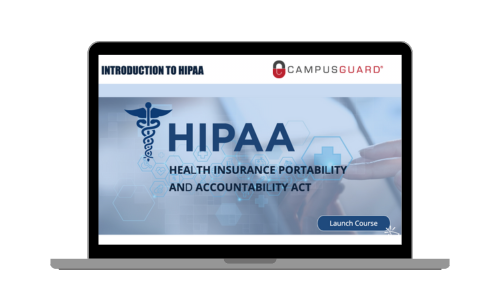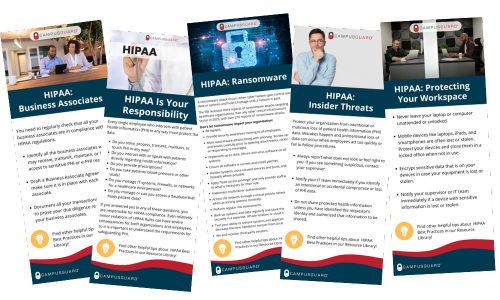HIPAA Awareness Training Course
Protect patient privacy, prevent data breaches, and avoid non-compliance penalties with the skills to identify and respond to security threats
HIPAA Awareness Course Description
CampusGuard’s HIPAA training provides covered entities and their workforce members with the knowledge and skills necessary to protect sensitive patient health information (PHI) in compliance with the Health Insurance Portability and Accountability Act (HIPAA).
- Target Audience: All staff accessing Protected Health Information (PHI); covered entities, workforce members, and business associates
- Course Length: 96 minutes
HIPAA Awareness Course Learning Objectives
HIPAA training covers the Privacy, Security, and Breach Notification Rules, which outline how to handle and protect PHI. Employees learn how to properly access, use, disclose, and dispose of PHI, including electronic PHI (ePHI).

HIPAA Awareness Course Modules
Our HIPAA Awareness course is designed with micro-learning modules, making the content easier to retain. You can choose to launch the training all at once or roll it out throughout the year to fit your team’s schedule.
-
Introduction to HIPAA
This module is designed to provide your organization and its employees with an overview of the Health Insurance Portability and Accountability Act (HIPAA) compliance requirements. The training will provide an introduction to HIPAA, discuss changes to the requirements, and explain the role of end users in ensuring compliance. -
Protected Health Information
Protected health information, or PHI, includes any information related to the past, present, or future health status of an individual that can be used to identify that individual. This module explains what data is considered PHI, with outlined examples and identifiers. -
Who Must Comply with HIPAA
This module will review the organizations and individuals that are responsible for complying with HIPAA. Training includes an overview of Covered Entities and Business Associates, responsibilities of all individuals who interact with health information, as well as a deeper dive into how HIPAA applies within educational institutions. -
HIPAA Privacy Rule
The HIPAA Privacy Rule regulates the use and disclosure of Protected Health Information held by Covered Entities and focuses on the rights of the individual and their ability to control their protected health information (PHI). This module reviews the key components of the Privacy Rule, along with patient rights and reasonable safeguards for protecting PHI. -
HIPAA Security Rule
The HIPAA Security Rule deals specifically with Electronic Protected Health Information (ePHI). This training module reviews administrative, physical, and technical safeguards users should implement to protect PHI. -
Risks to PHI
This module reviews common risks and threats to HIPAA environments. Training also outlines common HIPAA violations and walks users through several practice scenarios to test their ability to identify and prevent potential violations. -
Data Breaches and Reporting
This module shares best practices that should be implemented to prevent potential data compromise. Examples of data breaches and response efforts will be reviewed in detail. -
HIPAA Enforcement
A HIPAA violation occurs when a covered entity or business associate fails to comply with one or more provisions of the HIPAA Security, Privacy, or Breach Notification Rules. This module reviews common violations and enforcement, as well as penalties for non-compliance.
 Explore our other courses
Explore our other courses
Explore our full course library to find training that fits your needs, from security awareness and compliance essentials to specialized topics designed to support your role and responsibilities. Whether you’re looking to strengthen your cybersecurity posture, stay up to date with industry regulations, or broaden your knowledge, we’ve got you covered.
Our Latest HIPAA Course Updates
We update all courses annually to reflect evolving risks and requirements. The annual updates to our latest HIPAA training modules include:
- Changes to the Health Breach Notification Rule
- Proposed updates to the Security Rule
- HIPAA violation tiers
- HIPAA violation examples
- Common real-world scenarios
- Healthcare data breach statistics
- Expanded focus on insider threats
- Ransomware examples
- Third-party risks
- Linked resources
Access Our Resource Library and Threat Intel News
All HIPAA Awareness Course users also have access to our Resource Library, which offers supplemental materials that support the course content.
Our Threat Intel Briefing newsletter is sent directly to your inbox twice a month, and features the latest cyber threats, cyber crimes, and vulnerabilities happening now around the globe.

HIPAA Videos and Articles
HIPAA Compliance Essentials: Key Requirements and FAQs
In this video, CampusGuard provides an overview of HIPAA compliance requirements and addresses the most frequently asked questions about HIPAA.
HIPAA Compliance Essentials: Common HIPAA Violations
In this video, CampusGuard discusses some of the more common HIPAA compliance violations. We also give you additional information about HIPAA Compliance Assessments and the benefits of utilizing a third party to ensure your organization is fully compliant.
HIPAA Compliance Essentials: Benefits of a Third-Party HIPAA Assessment
This video discusses the benefits of conducting a third-party HIPAA Compliance Assessment. If you manage your organization’s HIPAA compliance program, this video will help you remain confident in meeting compliance requirements.
FERPA vs. HIPAA: Understanding the Differences for Higher Education Institutions
In this video, we discuss HIPAA and FERPA and the differences as they apply to higher education institutions. FERPA and HIPAA are both designed to protect sensitive personal information and prevent anyone without authorization from accessing the information. When it comes to protecting sensitive information, understanding which regulations and laws apply is key.
Achieve HIPAA Compliance with These 10 Steps
CampusGuard can assist your organization or hybrid entity in achieving HIPAA compliance by implementing the following 10 steps.
6 Benefits of a Third-Party HIPAA Security Assessment
Learn six benefits of partnering with a third-party organization to conduct a HIPAA security assessment to comply with the HIPAA Security Rule.
Related Products and Services
Empower Your Staff & Protect PHI with HIPAA Compliance Training
Empower your team to recognize and report phishing attempts, protecting sensitive data and reducing costly breaches.
HIPAA Awareness Frequently Asked Questions
HIPAA (Health Insurance Portability and Accountability Act) sets national standards to protect patients’ sensitive health information and ensure privacy and security.
All employees, contractors, and volunteers who handle or have access to Protected Health Information (PHI) must complete training.
The Privacy Rule (protects patient rights and PHI) and the Security Rule (safeguards electronic PHI).
- Failure to properly secure electronic health information: HIPAA requires covered entities to implement appropriate administrative, physical, and technical safeguards to protect electronic health information.
- Unauthorized access to patient information: HIPAA requires covered entities to limit access to patient information to only those employees or business associates who need it to perform their job duties.
- Failure to provide patients with access to their health information: HIPAA grants patients the right to access and obtain copies of their own health information.
- Failure to provide proper training: HIPAA requires covered entities to train their employees and business associates on privacy and security rules.
- Breach notification failures: HIPAA requires covered entities to notify patients in the event of a breach of their unsecured health information.
- Disclosure of patient information to unauthorized individuals: HIPAA requires covered entities to obtain written consent from patients before disclosing their health information to anyone who is not involved in their treatment, payment, or healthcare operations.



